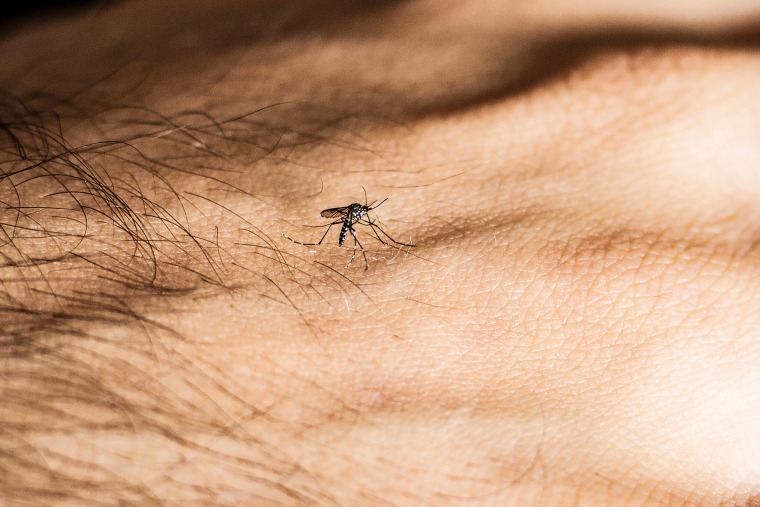What makes a person extra repulsive to a mosquito? It might be the scent of coconut.
That was one of the more curious findings of a small study published Wednesday in the journal iScience, which looked at whether different scented soaps made people more or less attractive to mosquitoes.
They found that the answer wasn’t as simple as use this soap, not that one. Instead, the interplay of scents between human bodies and the products they used proved to be much more complicated.
“It’s a simple question with a very complex answer,” said the lead study author, Clement Vinauger, an assistant professor of biochemistry at Virginia Tech who studies the molecular genetics of how mosquitoes choose their prey. “What really matters is how the chemicals in the soap combine with the chemicals of the individual person.”
That could explain why coconut seemed to repel mosquitoes, while citrusy scents known to repel the pesky insects instead appeared to attract them.
A winning combination
Only female mosquitoes seek out blood, and only after they mate, when they need its nutrients for their eggs to develop.
The rest of the time they feed on sweetly scented flowers.
When we use perfumed products on our skin, “we are blurring the lines between humans and plants,” Vinauger said. “Mosquitoes have a single resource that smells like both.”
A person’s scent comes from a unique combination of more than 350 chemicals, some of which are produced by the body and others that are produced by bacteria that live on and in us.
Everyone has the same chemicals, just in different ratios, some more attractive to mosquitoes than others, said Ali Afify, an assistant professor of biology at Drexel University in Philadelphia, who wasn’t involved with the new study.
There are a few known variables. Pregnancy or illness can change the chemical ratios and alter your attractiveness to mosquitoes. So can drinking beer or being physically active. Perfumes, soaps and lotions also play roles.
“Everything you use on your skin can make you more or less attractive to mosquitoes,” Afify said.
Surprising scents
To see which chemicals could tip the scales in either direction, four volunteers were each asked to wash with four different brands of soap — Dial, Dove, Native and Simple Truth. In each instance, the volunteer washed one forearm and left the other untouched and then wore nylon sleeves on both arms for one hour. They repeated the process with the three other soaps. After the hour was up, the researchers removed the odor-soaked sleeves. They placed each sleeve in a cup and put the cups in a mesh cage full of Aedes aegypti mosquitoes. The species is found in the southern half of the U.S. and as far up the East Coast as Connecticut.
The scent in the cup that attracted the most mosquitoes was deemed most attractive, and the results surprised the scientists.
All four soaps contained limonene, a compound found in citrus that is a known mosquito repellent. But that didn’t seem to matter in three of the four soaps. They made people more attractive to mosquitos.
The odor samples pulled from washed arms also had increased amounts of a chemical called terpene, a compound commonly found in essential oils and the one that gives cannabis its scent. The fact that the terpenes in soap seemed to make people more attractive to mosquitos didn’t seem to add up.
“Terpenes tend to be repellent,” said Christopher Potter, an associate professor of neuroscience at the Johns Hopkins University School of Medicine in Maryland who studies mosquito olfaction.
That the soaps weren’t repellent “suggests that what the mosquitos are picking up on is far more complicated,” said Potter, who wasn’t involved in the new research.
It could be that certain scents amplify repellent or attractive compounds that naturally exist in humans, rather than eliciting those responses themselves, he said.
In the end, the team identified four chemicals that were associated with being slightly more attractive to mosquitoes and three that appeared to repel them, but the results were generally weak and variable for all chemical scents tested except one: coconut.
“It confirms what past studies have found, that mosquitoes don’t like coconut-scented products, so our safest bet right now is to use those,” Vinauger said.
The new research was a proof-of-concept study, meaning the team set out to determine whether or not there was a phenomenon that warranted future research. It’s still unclear whether the coconut scent itself repels mosquitoes or whether it enhances one of the naturally occurring chemicals on human skin that is a repellent. It’s also unclear whether that is true for all of the roughly 200 species of mosquitoes that feed on humans or just the Aedes aegypti mosquitoes used in the study.
Because odors are complex — a specific combination of about 12 chemicals is responsible for the strawberry scent — a single scent or compound isn’t likely to be solely responsible for how attractive a person is to mosquitoes.
“Some may play a bigger role, but there won’t be just one that is the smoking gun that explains attraction,” Potter said.
CORRECTION (May 10, 2023, 12:38 p.m. ET): A previous version of this article misstated the name of university where Clement Vinauger is an assistant professor. It is Virginia Tech, not Virginia Tech University.
Follow NBC HEALTH on Twitter & Facebook.
